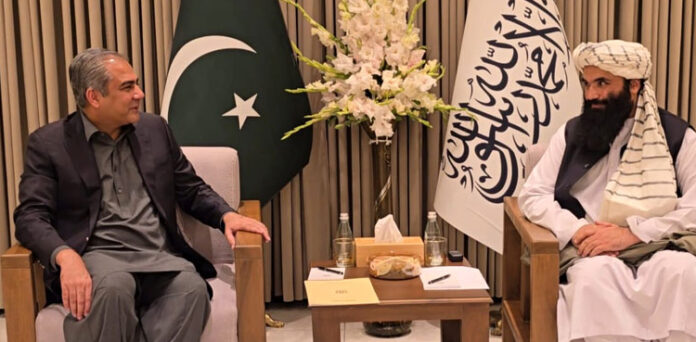KABUL: Pakistan and Afghanistan have agreed to reinforce cooperation for efficient border control and the eradication of terrorism.
The agreement was established during a top-level meeting in Kabul on Sunday between the Interior Minister of Pakistan, Mohsin Naqvi and his Afghan counterpart, Sirajuddin Haqqani.
The two leaders emphasised the importance of mutual respect, regional stability, and enhanced collaboration.
Discussions mainly discussed Pakistan-Afghanistan border cooperation, anti-terrorism measures, cross-border penetration, and the prohibited activities of the banned Tehreek-e-Taliban Pakistan (TTP).
Both sides explored Pakistan-Afghanistan border cooperation strategies for effective border control, restricting drug trafficking, and regulating cross-border movement.
The deportation of Afghan nationals residing illegally in Pakistan was also a key topic, with authorities highlighting the need for a distinct and corresponding process.
Mohsin Naqvi repeated that terrorist organisations are inciting unrest and unpredictability in the region, and emphasised that counterterrorism efforts must be joint and continued.
Mohsin Naqvi also reiterated Pakistan’s commitment to nurturing brotherly ties with Afghanistan and highlighted the country’s decades-long friendliness toward Afghan refugees, noting that lawful paths for Afghan citizens remain open.
The meeting was attended by high-ranking officials from both countries. This included Ibrahim Sardar, who is Afghanistan’s Senior Deputy Interior Minister, Mohammad Sadiq, who is Pakistan’s Special Representative for Afghanistan, and Khurram Agha, the Federal Secretary for Interior.
This recommitment to Pakistan-Afghanistan border cooperation and counterterrorism efforts comes in the face of increasing security threats along the frontier, particularly in Khyber Pakhtunkhwa and Balochistan, which have witnessed a surge in terrorist activity.
Read More: Terrorism emanating from Afghanistan serious threat: Pakistan
Earlier, Pakistan called on the international community to “speak with one voice” in order to hold the Taliban to their commitments, including not to allow the use of Afghan soil against any country and to ensure the shared goal of a stable and prosperous Afghanistan free from terrorism.



